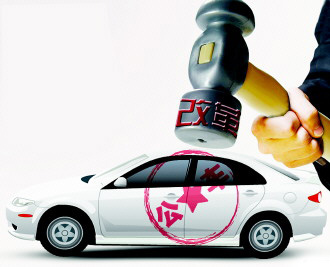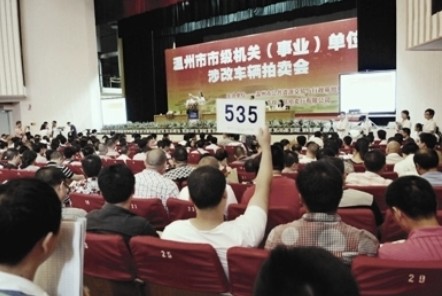

(Ecns.cn)--The city of Wenzhou in Zhejiang Province auctioned off 215 government cars last Monday in an apparent commitment by local officials to reduce public spending and set an example for similar reforms in other cities.
The 215 cars fetched 10.6 million yuan, 61.92 percent higher than the starting price. According to the Beijing News, the local government plans to sell nearly 1,400 vehicles—80 percent of the municipal fleet—by the end of this year.
Some 106 administrative departments and 207 official institutions will participate in the reforms, while public security departments, courts, national security departments, schools and hospitals are excluded, reports Xinhua News Agency.
Wenzhou Commerce Minister Su Xiangqing said the reform started from the city's Ministry of Commerce, which required that all government cars, except those specially designated for law enforcement and public service, be sold at auction.
Officials who have lost the use of government cars will receive transportation subsidies from 300 yuan to 3,100 yuan per month, based on their rank and position, says Xinhua.
For those working in city outskirts, top county-level officials can apply to rent cars and will be reimbursed later for their traffic expenses, the China Daily reports.
Chen Bo, director of Wenzhou's Office for Government Car Reforms, told the Beijing News that the local government has drafted a series of supporting measures to step up the reforms.
All the remaining vehicles will be marked as government cars. They will also be equipped with Global Positioning System (GPS) devices to prevent officials from misusing them for private matters, Chen said.
He added that special agencies will be set up to manage all official cars among various departments, as well as handle car rentals for officials in case of emergencies and long-distance travel.
Lin Jianfeng, general manager of the Wenzhou Government Vehicle Service Company, said last Friday that the company has been doing well since it was established two months ago. "We have 10 customers on average every day," he said.
However, not all the efforts have proven successful at cutting government spending.
At almost seven times the city's minimum wage, the 3,100-yuan subsidy to Wenzhou's top-level officials has been criticized as too high.
Some cited financial figures from the Wenzhou Development and Reform Commission (WDRC), arguing that the reform has increased government expenditures rather than reduce them.
Data show that WDRC spending on 24 vehicles was 1.33 million yuan in 2011. But its compensation to 156 officials is expected to reach 1.62 million yuan annually, about 300,000 yuan higher than the former.
Moreover, revenues from the auctions do not appear to be sufficient to fill the city's coffers.
Ye Qing, deputy to the National People's Congress, pointed out that the 215 vehicles sold at low prices, with the cheapest one fetching only 5,000 yuan.
Detailed introductions of the cars, including their appraised values and service lives should be made public online, some Web users also said.
Wang Zhenyu, a professor at the China University of Political Science and Law, told the Global Times that the reforms were good signs that local governments are making progress in addressing the issue.
"But if the cars of state-owned enterprises are also included, I'm afraid that the number waiting to be auctioned would be much bigger," Wang said.
He also suggested that the public should be told how the money earned from the auctions will be spent. The government still has a long way to go, he said.
"The biggest roadblock related to government cars is from the vested interest groups," because "they are both the policymakers of the reform and the beneficiaries of the cars," said Wang.
Provincial governments have been given two years to disclose their spending on cars, according to the Global Times.
The Financial Times cites industry estimates that about one in every five Audis in China – the German carmaker's biggest market – is owned by the government. More egregious examples (of police driving Porsches, and even a Maserati with military plates) have also prompted Chinese people fed up with official corruption to post pictures of the cars online.
In publicizing the auctions, the government is aiming to head off that anger, says the newspaper.

Copyright ©1999-2011 Chinanews.com. All rights reserved.
Reproduction in whole or in part without permission is prohibited.